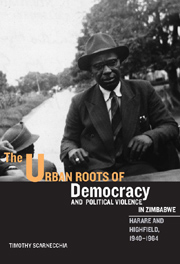Book contents
- Frontmatter
- Contents
- List of Illustrations
- Acknowledgments
- List of Abbreviations
- Notes to the Reader
- Introduction
- 1 Charles Mzingeli's Leadership and Imperial Working-Class Citizenship
- 2 Township Protest Politics
- 3 Resistance to the Urban Areas Act and Women's Political Influence
- 4 Changing Tactics: Youth League Politics and the End of Accommodation
- 5 The Early Sixties: Violent Protests and “Sellout” Politics
- 6 The “Imperialist Stooge” and New Levels of “Sellout” Political Violence
- 7 The ZAPU-ZANU Split and the Battlegrounds of Harare and Highfield
- Conclusion
- Notes
- Selected Bibliography
- Index
- Title in the series
6 - The “Imperialist Stooge” and New Levels of “Sellout” Political Violence
Published online by Cambridge University Press: 12 September 2012
- Frontmatter
- Contents
- List of Illustrations
- Acknowledgments
- List of Abbreviations
- Notes to the Reader
- Introduction
- 1 Charles Mzingeli's Leadership and Imperial Working-Class Citizenship
- 2 Township Protest Politics
- 3 Resistance to the Urban Areas Act and Women's Political Influence
- 4 Changing Tactics: Youth League Politics and the End of Accommodation
- 5 The Early Sixties: Violent Protests and “Sellout” Politics
- 6 The “Imperialist Stooge” and New Levels of “Sellout” Political Violence
- 7 The ZAPU-ZANU Split and the Battlegrounds of Harare and Highfield
- Conclusion
- Notes
- Selected Bibliography
- Index
- Title in the series
Summary
Reuben Jamela managed to gain a brief boost in popularity following a disastrous strike call by rival union leader Josiah Maluleke in May 1962. The Southern Rhodesian government arrested most of the key SRATUC leaders including Maluleke, and many striking workers were fired from their jobs. Jamela was able to negotiate the rehiring of some fired strikers, given his close ties to the Department of Labour and employers' preference for his union over the new one. Even though the May strike had failed, workers complained of intimidation in the morning and of having been beaten or threatened by groups of youth as they left for work. One man claimed to have been chased by “a gang of some 30 youths soon after leaving the bus stop.” The man recounted how that evening, the youth returned to his house and shouted “that since I had gone to work that morning I should come out and face the youths. When I refused, stones and bricks were rained on my house, breaking all the windows.” Now that the trade union movement was out of Jamela's leadership, employers and the state decided to use Maluleke's pro-ZAPU position to punish workers. The director of African Administration for Salisbury described this new strategy:
There is no doubt that the expression of political opinion is the cause of the most violent and frequent lawlessness in the township. […]
- Type
- Chapter
- Information
- The Urban Roots of Democracy and Political Violence in ZimbabweHarare and Highfield, 1940–1964, pp. 114 - 133Publisher: Boydell & BrewerPrint publication year: 2008



